 Being Ted Haggard (by John Frye)
Being Ted Haggard (by John Frye)
Much misunderstanding reigns in and damage inflicted by the act of judging others. Scot McKnight helps us land on our feet about this volatile issue as he explores Matthew 7:1-5 in his SGBC: The Sermon on the Mount. An easy error for Bible readers to make is to forget that the Story of God in the Bible is God’s omniscient perspective on the human race and individuals within it. “It is God’s perspective on us, not our perspective on others”(226). A study by Mark Allan Powell shows that when people read the Bible, preachers and pastors identify with Jesus and God and lay people identify almost always with characters other than Jesus and God. This may (and does) provoke some unnecessary judgments (226-227).
The Bible is emphatic that there is only One capable Judge—our God. When we judge others we are usurping the place of God (James 4:11-12). “But wait!” you cry, “Are we supposed to let anything—injustice, laziness, sin—go?” No. Scot writes, “This leads to what might be the cutting edge of learning how to read this passage most accurately: we must learn to distinguish moral discernment from personal condemnation” (227). Scot quotes John Wesley, “The judging that Jesus condemns here is thinking about another person in a way that is contrary to love” (227).
The structure of the text is: prohibition with warning—“Do not judge!” (7:1); extension, i.e., the measure we use to judge will be used against us (7:2); interrogation—the “comic and deadly serious” illustration of plank and speck in the eye (7:3-4); the alternative to condemning—honest self- analysis or self-care before caring for others (7:5). The semantic range of the key verb krino (‘to judge”) contains multiple meanings. Scot chooses the definition that indicates “assuming the posture of God in condemning others” (228). We have no right to pronounce to others, “You are condemned by God.” Again, this does not negate the role of discernment regarding “what is good” and “what is bad.”
“Humans have a proclivity to judge, and they have that proclivity especially if they know God’s will for society and have a zeal for God’s glory. But Jesus urges us to posture ourselves as God’s citizens in the kingdom, not as God” (230). We can learn to quit becoming condemners by first regularly examining ourselves. Jesus castigated the Pharisees because they believed that they had the divine right to damn all others.
Scot takes the time to tell Michael Cheshire’s story of getting to know Ted Haggard after Ted’s excursion into notorious public sin (232-233). Michael took the risk of befriending both Ted and Gayle Haggard and found them to be delightful, yet very broken people. So many others in the church who were without (that) sin were picking up stones and throwing them hard at Ted. When we learn not to condemn because we are not God, we discover God extending his marvelous, restoring grace.
Does this mean we end up with a “squishy moral theology in the church and culture”? No. Our moral discernment that lovingly says that some things are wrong is not judgmentalism, even though the culture may keep chanting its mantra that “Christians are judgmental.” Judgmentalism is a knife that cuts two ways. Discernment is not the same as judgment. Some Christians are intolerant of other people’s beliefs and behaviors because those things are a violation of revealed truth and God’s character. This is a tension with which we all must live.
I have often wondered what Jesus wrote in the dust in the confrontation with the Pharisees and the woman caught in adultery recorded in the disputed pericope John 7:53-8:11. Scot is the first New Testament and Jesus scholar that I have read who offers some speculations (235).














